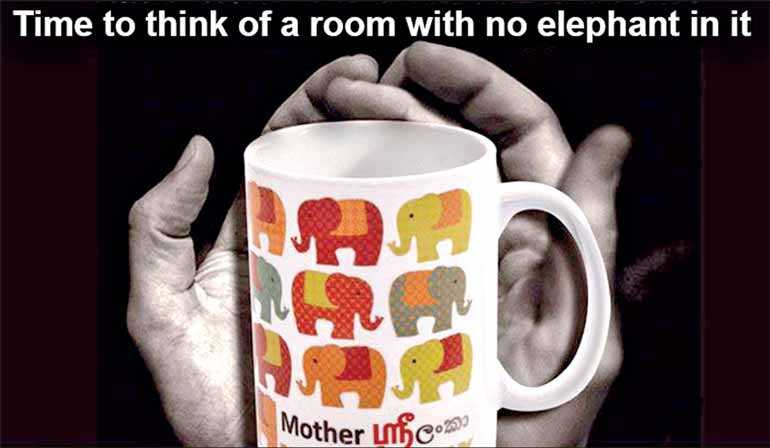Thursday Feb 19, 2026
Thursday Feb 19, 2026
Friday, 19 July 2019 00:00 - - {{hitsCtrl.values.hits}}

Imagination can be a powerful tool for shaping everyday reality. We use it to construct everything from the mundane to the mystic. A down-to-earth example would be our subscription to the idea of the intrinsic value and worth of every human being. 
It is not a self-evident truth – at least, not to me. Not when I look in the mirror on Monday morning. Or look over the fence at my neighbour’s backyard. Or look over the wall at the madding crowd swarming to work, school, or the heady task of running a country.
But the law and the letter of the constitution, my own religious conviction plus personal philosophy of life – both shared by many others – and the pressure of society at large to conform to this reassuring basis for modern-day living convinces me of it in general. Shall we not agree that this is why we love our neighbours as we love ourselves? Even though neither she nor I (or you or they) are particularly loveable on Monday mornings!
However much we may bicker about the basic beliefs of our respective religions, the fundamentals of each faith or philosophy share the common understanding of humanity as a measure of and meaningfulness in all things. Therefore – and even though we differ and disagree about the origins, praxis and fate of human beings – we find our mutual regard. And in rare cases: respect for the principles, values or tenets of the other’s right to live and worship (or not) alongside us.
You may not thank God it’s Friday. But you believe that it is the fifth day of the working week. And your shared belief with billions of others that this arbitrary 24 hours in which a humble planet orbiting an insignificant star at the unremarkable edge of an ordinary galaxy on the vast cosmic scale of things completed a revolution on its own axis brings an (imagined?) sense of relief that the weekend (whose imagination came up with that equally arbitrary concept?) is at hand…
Imagined reality is the glue that holds individuals, communities and nations together. We live and move and have our being in a shared cocoon whose amniotic waters are perhaps unequally comforting to us. It is what gives us our sense of security as well as our insecurity – often, at the same times.
For instance, there is no such creature as ‘Mother Sri Lanka’. But we have collectively imagined our ‘motherland’ in a matronly form that is not always as ‘motherly’ as all her children would wish her to be. At times, she’s protective of all her offspring; at others, prone to human frailty and hopeless favouritism. We’ve all felt the hug, as well as the pinch. And so, tied to the apron strings of that variant image in tension – affectionate and authoritative, close yet claustrophobic, nurturing but mean and nasty at times – we cling to some of our atavistic childhood traits. Rather than growing up to actualise a more modern and meaningful identity or destiny.
It’s what keeps us primitive in our approach to life and mores; embracing compassion for all suffering beings on one hand and hanging criminals with the other. It’s what makes some of us progressive in spite of our fears of taking our place in the sun; affecting everything from cricket to commerce to complicity in geopolitical conspiracies. It’s what makes us perhaps a tad retarded and insular about regional power blocs and the shadowy threat of terrorism in our backyards; where being global in our thinking and internationally oriented in our outlook, while not losing our unique sense of identity as an island poised on the cusp of destiny, would serve us better. We are sons and daughters of a small island, true… but the sooner we realise that we’re scions of a greater destiny, the better. And one way to do that is to turn the spotlight on our shared imagined realities.
Our head hurts
One of the more insidious instances of our imagined reality is our continued and collective subscription to the executive presidency. It is a test-tube baby: the progeny of our flawed and still failing experiment with the republican form of governance. After all has been said and done – and usually, much has been said and very little done – we continue to carry both baby and bathwater into a brave new world that is neither new nor brave.
No one can forget how candidate after creeping candidate has solemnly sworn to abolish the executive presidency no sooner they assume that very mantle. Yet, no elected head of state has been able, ready or willing to fall on their own swords once ensconced in office. With that said (and everything else about the lacunae and lackadaisical response of the body politic left unsaid) it is the collective subscription of civil society to the ideas associated with this pernicious estate that has permitted its continued existence. We believe – in varying shades of fear or fervour – that it is a good, a necessity, or a necessary evil. The respective political parties appear only too happy to agree and join us in our reverie.
Only a collective reimagining of our first estate will rid us of the vile thing. But even if so, there is no guarantee that a flushing out of the executive presidency per se – by fiat or faith in constitutional amendments such as the putative 20A – will cleanse our Augean stables. In a polity that has proven itself to be less than bipartisan, and where a mercurial uni-culture has united all political parties and ideologies in a venture that’s more trade and commerce than civics and governance, there’s more that needs to be done than abolish a corrupting administrative chair. There has to be the conception, creation and continuation of a new imagined reality to replace it and transform the existent political culture into something that better resembles a robust government rather than a profitable business.
Last best hope
A few trends militate in this direction, perhaps to cheer us up on feverish TGIFriday (or manic-Monday or whenever it is you’re reading this).
First and foremost, the electorate is bestirring itself once again to imagine a constitutional reality that is more Westminster than ‘Polonnaruwa’ or ‘Hambantota’. While nothing may come of the JVP’s agitation and the popular movement of sentiment against another avatar of Mahinda Maama or a reincarnation of Maru Sira, it is good and fitting that the untouchable heads of state sitting invincibly in their hot seats receive a startling cattle prod now and then or time and again.
There is something eminently satisfying in seeing the light dawn in eyes dulled by the trappings of power and the soothing falsities of sycophant fuelled addiction to high office. Maybe we may wise up and leave off traipsing to the polls so that by virtue of returning a low voter turnout, we send at least a weak signal that we’re not gobsmacked; we’re not gullible; and we’re not going to be taken in by the usual suspects ever again.
Second, a slew of independent candidates are reportedly girding their loins to contest the executive presidency this time around. While this may seem ironic – given that the ideal is an abolition of the office, not increased aspiration for it – it might be in the nature of a tonic, too. Critics will cite cynical ploys to split the popular vote. However, despite the lacklustre showing of all independent contestants without exception since 1982, it is a first step towards that day in the far future when someone outside the traditional framework can wear the purple of our presidency. One can only hope. And encourage that panoply of contenders from every tribe and tongue – media, biz, also civil society – to take a shot at reimagining that reality when a poet or a philosopher rather than a political animal is Sri Lanka’s proud primary independent president.
Thirdly, there’s the public outcry (at least on social media) against the perceived ethos of certain presidential hopefuls ostensibly making straight their path to the throne. In a recent development that might well cause concern about the shape of things to come, the official machine of a candidate yet to receive formal nomination tried resorting to the strong-arm tactics familiar to it under a previous dispensation.
Taking on the critical engagement of a senior journalist who expressed a personal opinion about the plight of women in Sri Lanka vis-à-vis a proposed car-free zone in Colombo, the media campaign of a former bureaucrat turned bogeyman frontrunner harshly criticised the scribe and went as far as suggesting she leave the country. Coming from a machine that once allegedly drove the white van movement, this bullying behaviour at best (or verbally thuggish terrorism at worst) created a civil society backlash that left no one in the blogosphere in doubt as to what the mainstream of people imagine their reality to be – if the old goons under a new generalship of authoritarian misogyny in the guise of defence and security of the realm were to return.
The executive presidency and our collective subscription to it – in whatever shape or form – may be the least of our worries in the run-up to the poll. Maybe the crucible of our reimagined reality lies not in the sphere of politics at all. Perhaps it is in our psyche, our latent identity, our collective social consciousness that the alchemical solution to our present malaise lies. If we cannot imagine a nation state where every islander – from Sinhala-Buddhist writers who are free to fantasise in fiction; to Muslim doctors who are deemed worthy by virtue of their craft rather than their creed – has an equal and constitutionally inviolable right to life and liberty, we’re too insular to even consider swimming in the global mainstream… much less thrash around like a fish in an eddy in the backwaters of our myopia and misogyny.
(Journalist | Editor-at-large of LMD | Writer #SpeakingTruthToPower)